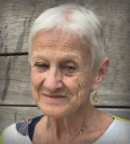My intuition about my health has served me well over the past 10 years, possibly even saving my life from two serious cancers. In 2013, I was diagnosed with follicular lymphoma. I believe that my awareness of changes in my body led to its early discovery.
One evening, after exercising at the gym with upper body weights, I felt an ache under my right arm. Upon closer examination, I could feel a small oval-shaped bump slithering around just below my right armpit, near the upper part of my right breast. I did not know, or was not sure, that it was a lymph gland.
The next morning, I called my primary care physician and was able to get an appointment for the following day. Although he told me he did not think I had cancer, he immediately arranged for me to have a biopsy of the mass, which confirmed that I had follicular lymphoma. I underwent 6 months of chemotherapy and have been in remission ever since. This, however, is just the beginning of my cancer journey.
Receiving a Diagnosis of
Pancreatic Cancer
In the spring of 2021, I felt an increase in the intensity of an occasional pain in the upper right side of my abdomen. I had been feeling pain in that area for many years, but blood, urine, gastric, and other tests, including a colonoscopy, failed to turn up any evidence of disease. Now, however, the pain was becoming more intense and was causing my stomach muscles to seize up. Once again, I realized I had to track down the source of the problem.

“Despite my age, there is still more I want to accomplish while I can. I hope to raise awareness of pancreatic cancer and the importance of screening and early detection.”— Diana Heller
Tweet this quote
My primary care physician ordered a computerized tomography scan of the area. When the test result showed up in my patient portal, MyChart, I was confused and concerned about the finding. The test result appeared to indicate there was a suspicion or likelihood of cancer in my pancreas, but when I spoke to my doctor, she said I did not have cancer. Fortunately, she ordered a magnetic resonance imaging (MRI) scan for additional evaluation of the pancreas. Although the test was inconclusive for cancer, a shadow picked up on the MRI suggested pancreatic cancer, which was later confirmed from a tissue sample of my pancreas obtained by an endoscopic biopsy.
Unraveling the Mystery of
Pancreatic Cancer
The diagnosis was upsetting but not all that surprising. Both my sisters died of pancreatic cancer at ages younger than I am now, and other family members have been diagnosed with various other types of cancer. Because of the history of pancreatic cancer in my family, I have undergone genetic testing for the disease, and I do not have a specific germline genetic mutation that increased my risk for developing this cancer.
I am grateful that my two adult children have also tested negative for a gene mutation that could increase their risk of pancreatic cancer. They and I are now enrolled in the Pancreatic Cancer Early Detection (PRECEDE) Consortium (https://precedestudy.org; https://classic.clinicaltrials.gov/ct2/show/NCT04970056). This is an international, multi-institutional observational prospective study enrolling individuals with a family history of pancreatic cancer and/or individuals carrying pathogenic or likely pathogenic germline variants in genes linked to the development of the cancer. We are now receiving surveillance care from Diane M. Simeone, MD, principal investigator and Executive Committee Chair of the PRECEDE Consortium. Dr. Simeone is the Laura and Isaac Perlmutter Professor of Surgery and Pathology; Director, Pancreatic Cancer Center; and Associate Director, Perlmutter Cancer Center at New York University Langone Health.
Choosing Life
My enrollment in the PRECEDE study has given me confidence that any changes in my health status will be detected early, which, I trust, will keep me a step ahead of serious consequences even if I do have another recurrence. Nevertheless, I worry the cancer will recur, since that is common with this disease.
At age 81, although I don’t feel frail, I do feel vulnerable to this disease. Despite my age, there is still more I want to accomplish while I can. I hope to raise awareness of pancreatic cancer and the importance of screening and early detection. My experience shows that a diagnosis of this cancer need not be a death sentence, especially if the cancer is detected at an early stage.
I hope that between the surveillance care I receive in the PRECEDE trial and my own instincts regarding my health, I’ll be able to accomplish these goals and continue to contribute to research in this still deadly cancer.
A retired criminal defense lawyer and a London Blue Badge Tourist Guide, Ms. Heller lives in New York City.
Editor’s Note: Columns in the Patient’s Corner are based solely on information The ASCO Post received from patients and should be considered anecdotal.

